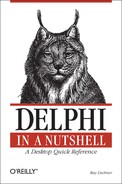Name
Variant Type
Description
The Variant
type is a dynamic type. A
Variant variable can change type at runtime,
sometimes storing an integer, other times a string, and other times
an array.
Delphi automatically casts numbers, strings, interfaces, and other
types to and from Variants as needed. You can also
use a number of functions to further manipulate and work with
Variants.
Chapter 6, lists all the possible types for a
Variant.
Tips and Tricks
Variants offer flexibility, but you pay a performance price. Even simple arithmetic with
Variants is much more complicated and time-intensive than arithmetic with typed variables. Every reference to aVariantmust be checked at runtime, which can be costly if your program often usesVariants.Variants are usually easy to understand and use, but they have some subtleties. For example,UnassignedandNullrepresent distinctly differentVariantvalues and concepts. One way to think of the difference is to imagine aVariantas a box that contains a piece of paper. On the paper is written theVariant’s value: a number, a string, the time of day, etc.Nullis a blank piece of paper.Unassignedis an empty box.To convert a
TDateTimeto or from aVariant, you must use the functionsVarFromDateTimeandVarToDateTime.The most common use for
Variants is calling an OLE automation server when you don’t have adispinterfaceat compile time. You call the server’s methods, but Delphi cannot look up the methods at compile time, so it checks them at runtime. Ordinarily, you could not call a method without having a base class or interface to declare the method’s name, arguments, and return type, but using aVariant, you can defer these details until runtime, when Delphi uses the server’sIDispatchinterface to look up the method and its signature.
Example
var WordApp: Variant; A, X: Variant; begin WordApp := CreateOleObject('Word.Basic'), WordApp.FileNew; X := Pi; X := X / 2.0; // Mix Variants and numbers in expressions. ShowMessage(X); // Delphi automatically converts to a string. // Create a 3x3 matrix. A := VarArrayCreate([1, 3, 1, 3], varDouble); for I := 1 to 3 do for J := 1 to 3 do A[I, J] := I + J; end;
See Also
| ChangeAnyProc Variable, ClearAnyProc Variable, EmptyParam Variable, Null Variable, OleVariant Type, RefAnyProc Variable, TVarData Type, Unassigned Variable, VarArrayCreate Function, VarArrayDimCount Function, VarArrayHighBound Function, VarArrayLock Function, VarArrayLowBound Function, VarArrayOf Function, VarArrayRedim Procedure, VarArrayRef Function, VarArrayUnlock Procedure, VarAsType Function, VarCast Procedure, VarClear Procedure, VarCopy Procedure, VarDispProc Variable, VarFromDateTime Function, VarIsArray Function, VarIsEmpty Function, VarIsNull Function, VarToDateTime Function, VarToStr Function, VarType Function |
